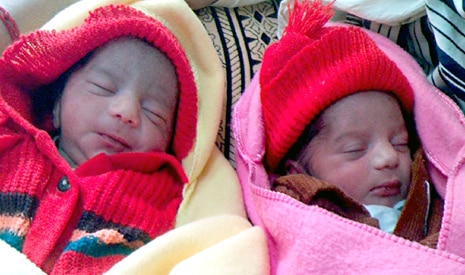
Patients at ‘likely catastrophic risk’ because faulty ventilation spreads dangerous infections from operating theatres, documents reveal
ONE of Britain’s first Private Finance Initiative hospitals has subjected patients to “likely catastrophic risk” because a faulty ventilation system installed by the PFI contractor has been spreading dangerous infections from operating theatres into the rest of the building.
In internal papers passed to the local MP, Jesse Norman, and seen by The Sunday Telegraph, consultants engaged by Hereford’s County Hospital say all eight of its operating theatres have “significant ventilation deficiencies” which “are associated with increased infection rates and outbreaks of airborne diseases” in the hospital.
Patients undergoing operations also risked contamination. Derek Smith, chief executive of the hospital’s parent body, Wye Valley NHS Trust, described the failings as an “extreme risk to patients’ safety.”
The hospital patient death rate for the Wye Valley trust, as measured by the NHS’s standard mortality indicator, was 11 per cent above the English average in the last month reported, July 2013 – and as much as 33 per cent above average at one point last year. Hereford County is the trust’s main hospital.
Some of the operating theatres were also built without basic communication equipment, the papers say, meaning surgical teams could not get help in an emergency without leaving the patient.
“During operations, events regularly occur that require additional emergency assistance to be summoned urgently, [such as a] cardiac arrest,” one report, dated last month, says.
“The current method relies on a member of staff using a domestic rape alarm which is thrown into the theatre corridor.”
In one “possible major incident” on September 19 this year, the doctor in charge could not ventilate a patient and needed urgent help.
The team “threw the rape alarm into the corridor as per normal procedure,” but nobody heard and help did not come.
In a letter dated 9 October, and seen by The Sunday Telegraph, Jim McClure, the trust’s PFI contract manager, wrote: “The absence of a fully-compliant nurse and emergency call system in the theatre department presents a serious risk to the health and safety of our patients, demonstrated by two near-misses in the last four weeks where a member of staff could not alert their support team to the need for assistance while dealing with a patient.”
Staff in the hospital’s maternity unit have also been exposed to illegal levels of nitrous oxide gas as a result of faulty equipment.
The gas, used as an anaesthetic for patients, has been leaking, described by Mr McClure in another letter dated 19 November as a “very worrying development” that “needs urgent and immediate attention.”
A number of delivery rooms for expectant mothers were closed because of the problems.
The hospital has also been under a fire enforcement notice for the last year after the new management discovered the building had not been properly “compartmented” to stop the spread of fire.
Supposedly fire-resistant doors and walls installed by the PFI contractor, Mercia Healthcare, did not conform to safety standards or come from any identifiable manufacturer of fire-safe products, an inspection found.
Months of correspondence – including lawyers’ letters – followed as NHS managers attempted to get Mercia to fix the doors.
The hospital was described by Mr Norman as powerless to fix the glaring flaws in the PFI scheme. “The building and equipment have given enormous trouble, but the PFI contract gives the Trust very limited rights,” he said.
“It is incredibly frustrating for the staff, and potentially disastrous for the patients.”
Hereford was one of the first hospitals to open under Gordon Brown’s PFI, where Mercia built the hospital and effectively rented it back to the NHS. The building has a capital value of £64 million, but taxpayers will be forced to pay Mercia a total of £433 million for it over a 30-year period to 2028.
Remarkably, Mercia has also been given the land and assets for a further 95 years after the contract expires, until 2123, raising the possibility that the hospital could be thrown off the site altogether in 2028.
The deal is supposed to include maintenance, but the problems with the ventilation system appear to have arisen in part because it was not properly maintained.
Mr Norman said: “Hereford Hospital has superb doctors and staff.
But it has had to deal over the years with gross underfunding from the NHS, and a terrible PFI contract.
“The operating theatres are intended to be under positive pressure to keep microbes and contamination out, but these documents show that the pressure wasn’t adequate, and contamination was building up.
“In the dirty area, the pressure should reversed to make sure that the bugs stay in. On one of these dirty areas, it appears the ventilation was the wrong way round and has been pushing bugs out into the hospital.”
The hospital operates a “risk management” system, with risks graded from 0 to 25. The operating theatre problems are graded 20, defined as an “almost certain major risk” and a “likely catastrophic” one.
The ventilation problems may have been going on for some considerable time, but were only spotted last month.
Two operating theatres were initially closed, with dozens of operations cancelled and others moved at public expense to the city’s private Nuffield hospital.
Action has been taken to “mitigate” the problems in the other theatres, the documents say, and patient “case selection” is made “on a daily basis.”
Mobile decontamination units have been brought into the wards to reduce airborne microbes.
Hereford is the latest PFI contract to have been criticised for enormously expensive contracts delivering often shoddy buildings.
Two years ago, the Telegraph exposed how taxpayers were paying £229 billion under the initiative for new hospitals, schools and other projects with a capital value of just £56 billion.
Some of the early contracts are due to run for 60 years, meaning taxpayers will be paying for the projects for generations to come.
Many allow massive overcharging for trivial work, such as the PFI hospital which was charged £52,000 to install a smoking shelter.
Some PFI contractors, meanwhile, are earning returns of up to 71 per cent.
Mr Norman, who has been a fierce critic of the PFI, said: “It was my own hospital which drove me to launch a national campaign against the PFI. There has been huge overcharging at Hereford.
Now it appears that Mercia and its sponsors have failed to maintain equipment, ducked necessary improvements and fought to prevent public disclosure.
“Patient safety is absolutely paramout. But however bad Mercia’s performance, it seems there is virtually nothing the Trust can do.”
The hospital said last night that Mercia and its operating contractor, Sodexo, had undertaken “remedial work” in the faulty theatres and they could now be used safely.
“We regret that operations had to be postponed, but all patients who needed urgent operations were treated and we have put in place measures to ensure that postponed operations are now undertaken,” a spokesman said.
“The Trust, together with Mercia/Sodexo, will continue to closely monitor the ventilation performance to ensure that it continues to be safe to use the theatres.”
The spokesman said that the fire enforcement notice was withdrawn last week after improvements were made. She said that the problems with the gas emissions in the maternity unit were being fixed and that all but one of the delivery rooms was now back in use.
She said no mothers had been affected by the gas, only staff.
Source: inagist




 An Indian origin doctor in Britain has received an excellence award for his work across the medical space.
An Indian origin doctor in Britain has received an excellence award for his work across the medical space.
 Hyderabad, Nov 26 (IANS) The American Academy of Ophthalmology (AAO) honored eminent ophthalmologist Gullapalli N. Rao with its outstanding humanitarian service award, said a statement here Tuesday.
Hyderabad, Nov 26 (IANS) The American Academy of Ophthalmology (AAO) honored eminent ophthalmologist Gullapalli N. Rao with its outstanding humanitarian service award, said a statement here Tuesday. New Delhi: A team of doctors, led by Dr Vivek Nangia, head and director – pulmonology, at Fortis Flt Lt Rajan Dhall Hospital here, have treated a critically ill patient suffering from interstitial pulmonary fibrosis (IPF) and chest infection resulting in ARDS (acute respiratory distress syndrome) using extra-corporeal membrane oxygenator (ECMO). This makes her the first and the only IPF patient in India to survive after being mechanically ventilated and weaned off using ECMO, according to the doctors.
New Delhi: A team of doctors, led by Dr Vivek Nangia, head and director – pulmonology, at Fortis Flt Lt Rajan Dhall Hospital here, have treated a critically ill patient suffering from interstitial pulmonary fibrosis (IPF) and chest infection resulting in ARDS (acute respiratory distress syndrome) using extra-corporeal membrane oxygenator (ECMO). This makes her the first and the only IPF patient in India to survive after being mechanically ventilated and weaned off using ECMO, according to the doctors.

